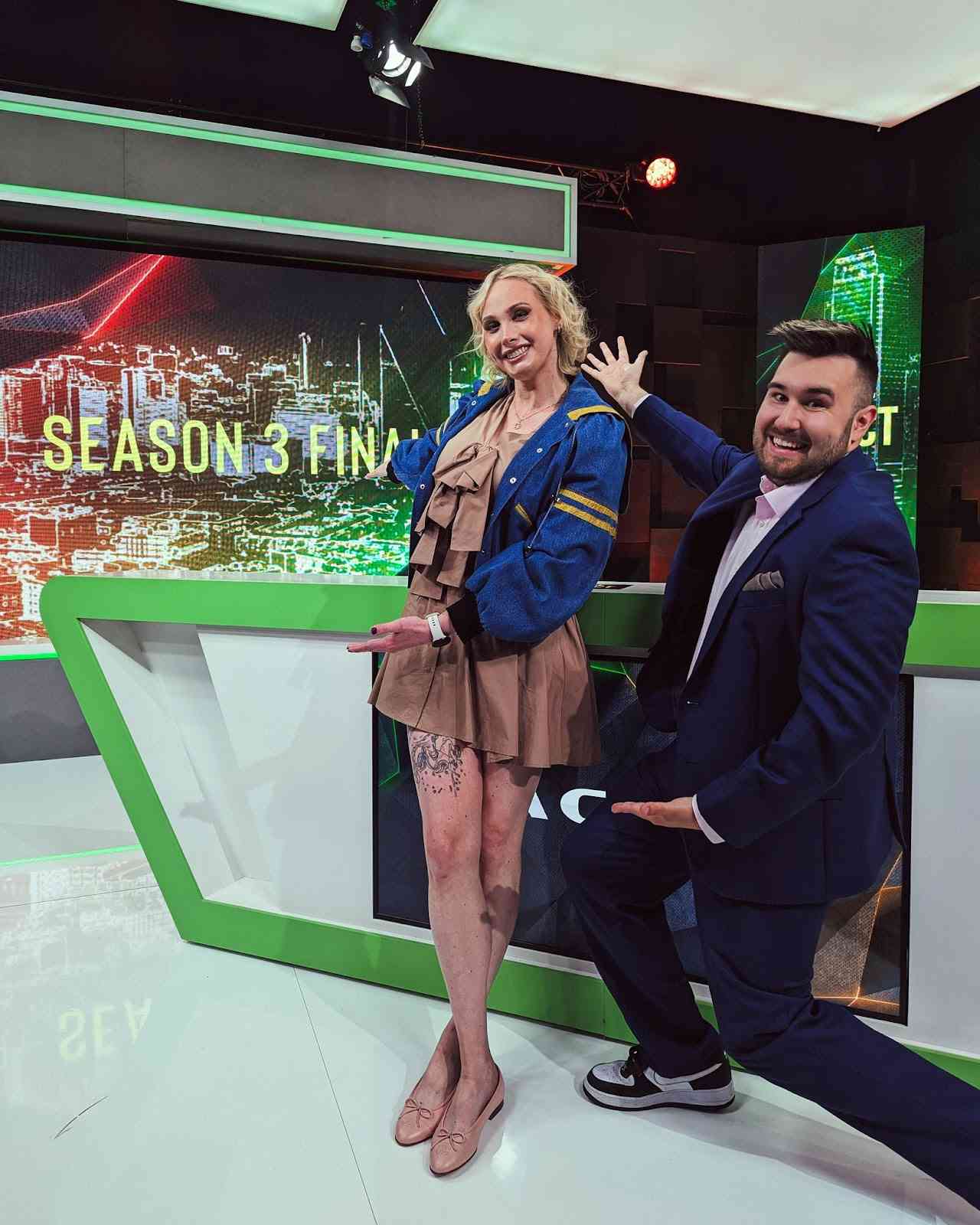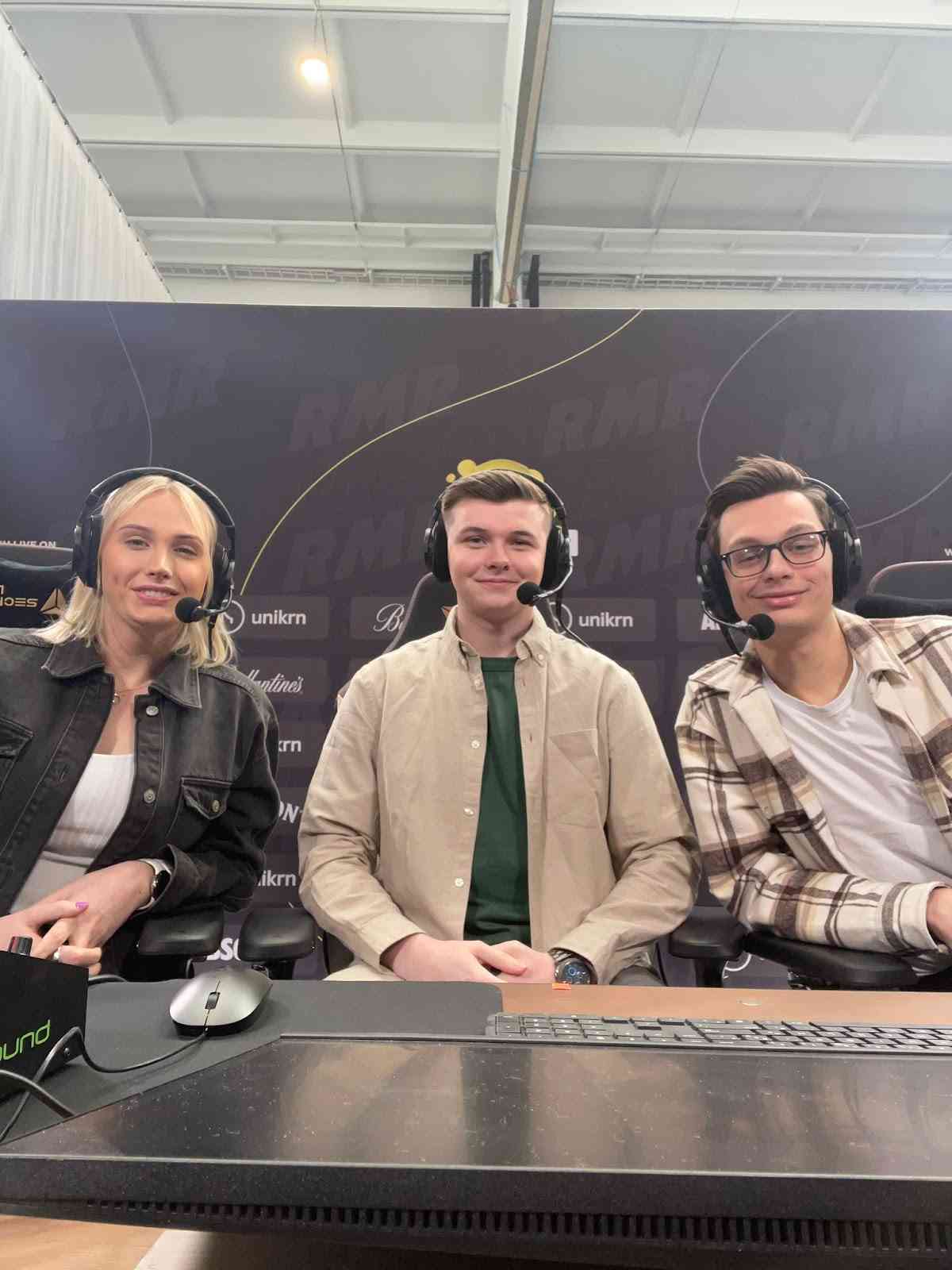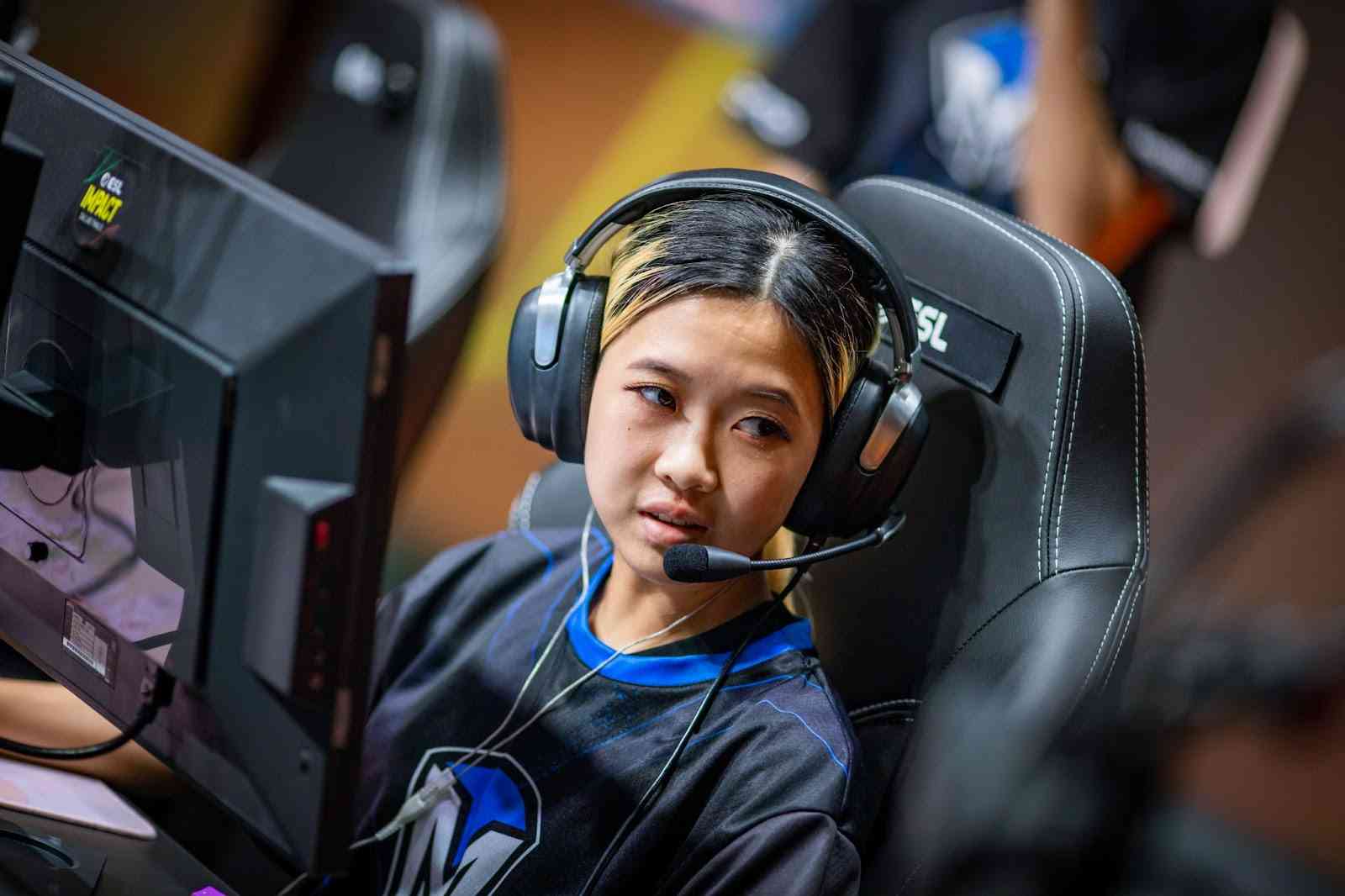The ESL Impact League, in addition to being a springboard for women to formulate a career in professional Counter-Strike, has shown to be the start for others on the talent (i.e. casting and analyst work) spectrum. Of those who were able to start covering CS through Impact is Australian commentator Lucy “LucyLuce” Eastwood.
LucyLuce’s trajectory in CS, since starting work in Impact, has helped her land gigs in a variety of B to S-tier events including WePlay Academy League, ESL Pro League, the European RMRs for both the Rio and Paris Majors and more. It’s quite a trail of success for someone who formally started her CS career in April 2022, alongside a bevy of already established people within the same field. Nevertheless, after plenty of hard work and diligence, Lucy, propped by her passion and knowledge of the game, has firmly established her own place in the game as it transitions to CS2 in 2024 and beyond.
During the ESL Impact Season 3 Finals, BLIX talked to LucyLuce about her experience covering this event and its previous editions, how she looks back at her first year in commentating pro CS, the continued progression of the women’s CS circuit and more.
Working remote for ESL Impact
Pedro Romero, BLIX.GG: Thanks for taking the time for this interview, Lucy. For the majority of ESL Impact, during in-person LANs, we’ve seen the casters and analysts work the games via remote and you have done the same for this occasion. Does it feel like you’re missing out when you work remote? Do you feel like you miss out on the emotion and energy that brings about a certain match compared to when you’re casting in-person?
Lucy “LucyLuce” Eastwood: Yeah, absolutely. It’s night and day in terms of the connection you feel to the event. Obviously, we’re still casting the same game and are surrounded by everyone here and the talent team who is invested in it, but there’s nothing like the feeling of being able to hear the crowd and see the players and actually talk to them. That’s a big thing we got at Valencia.
We could actually talk to the teams and get a sense of how they’re feeling and ask questions that you wouldn’t be able to ask normally just to understand them more because, with these teams, it’s not like there’s a lot of information out there on some of them, so being able to talk to them makes a big difference. But I think for me, when you’re casting, if you can hear the crowd and if you can hear your voice in the crowd, that’s one of the highest highs you can get and obviously you don’t get that here.
I can’t even hear the crowd, unfortunately, since I don’t think there is any crowd mic setup. You kind of want to be like, “Hey Dallas, can you hear me? Make some noise” but they can make the noise but I’m looking to hear it, which kind of makes it not quite the same experience.
BLIX: Diving into your contribution with ESL Impact, you’ve started building a partnership with BDog, he’s been one of the most consistent partners for your matches. How has that particular casting partnership with BDog developed since the first time you worked with him? Also, what has been the biggest thing that you had to work on in adjusting to his style of casting?
LucyLuce: It kind of worked out really well for us because we both wanted to get started casting at the same time and we happened to know each other, so it all kind of just came together which was really good. And he’s just a really good person so it makes it really easy to work with him and we have a really good back and forth. It feels very natural when we’re casting together. In terms of things, we’ve been working on, we still obviously have far more to go because we’ve only been casting for a year and a half so we have a lot to develop as a duo, but I think it’s just working out when each person needs space and we kind of move to more of a hybrid casting.
Sometimes, even though I’m more predominantly play-by-play, we’ll kind of go back and forth and it’s all about finding the comfort of knowing when’s the right time to be building on the other person’s point or jumping again with your own kind of bit. It’s all a learning experience and I think every event we improve and hopefully, that’ll continue.

Image Credit: LucyLuce/Twitter
One year in the books for LucyLuce
BLIX: As you mentioned, you started casting around a year ago, and since then, you’ve put in a lot of work in trying to catch up with the rest of the casting scene while learning, evolving and developing as quickly as you can. As you’re one year into your casting career, do you feel you’re close to reaching the same level as the more established casters in the league?
LucyLuce: If we’re talking about Tier-1 talent and casters there, Counter-Strike is very lucky to have some of the best talent in the entirety of esports. I’m not gonna try and pretend I’m anywhere near the skill and experience that any of the top casters have. I am a very long way off and I acknowledge that I’ve got a long way to go and I think it’s been a learning experience for me because the last year has been quite rapid in terms of growth. I went from working a full-time job up until about November last year where I decided to quit to pursue this dream because I love doing it’but I know I have so far to go.
I would not be putting my name anywhere near the names of the people at the top, but obviously, that’s the objective. That’s where I want to be, and I’ll only get there by doing more events and improving and hopefully [gain] some more experience at the top level. I’ve had a few events this year at the RMRs and EPL where I got to work with some of the best talent in the business and that is a big, massive learning experience for me, but yeah, it’s a long road and it’s a tough road at times.
BLIX: I want to get your perspective on working in those RMRs because I say it marked a pretty big leap for you and your career. From starting off in Impact to then working in the RMRs for IEM Rio 2023 and even the Paris Major, the last major of CSGO, were you surprised to even be considered to work in those events?
LucyLuce: Absolutely. Especially with the Paris RMRs, that was a big surprise because I’d never done anything with BLAST before but I think it kind of came from [me doing] EPL. I guess I was now on a few more people’s radars and BLAST wanted to bring in new talent in for the RMRs, which I think was a cool idea, but it was definitely unexpected.
While I definitely do try my hardest, it’s a massive step up to work those events and I think particularly in terms of just how exposed you are to so many people, you go from casting games with a couple of tens of thousands maybe at most’maybe an ESL Challenger League game has like 15,000 if it’s a good one’but then you’re going in your casting for FaZe-Cloud9 with around 100 to 150,000 people and that’s just a massive shift.
That has been the most difficult thing for me to kind of grapple with but it’s all part of the journey.

Credit: Dinko/Twitter
On ESL Impact, Game Changers and personal favorites
BLIX: And the same sort of journey can be said about the progression and growth of ESL Impact League. With other women’s leagues that are taking a bigger presence within the general esports scene like Game Changers in women’s Valorant, what do you think Impact must do in order to take another big leap towards their exposure and popularity to the same level that Game Changers has enjoyed recently?
LucyLuce: It’s difficult to compare the two just because, in terms of where they come from. Game Changers is directly from Riot so it’s always going to be championed by the developer. It’s much more in the spotlight. It’s given a lot more resources to grow and to prosper, but I think for ESL impact, the actual format is doing its job in terms of the objective being to lift up the scene and revitalize it and that’s definitely happening. I’d like to see maybe other events pop up in the calendar.
They don’t have to be ESL, but obviously they have been the champions of women’s CS in the last year and a half, but I’d like to see more stuff in the calendar. We’ve got so many strong teams in Europe that I think don’t necessarily get as much spotlight as what you’d like to see because there’s only so many spots at the Finals. I guess the other thing is the calendar, as it stands, all of the ESL Impact Finals are always on at the same time as a big men’s events. At the moment, obviously it’s IEM Dallas and last time it was IEM Katowice.
Now, that is actually going to be different for the Season 4 Finals so I’m really excited to see what that looks like when there’s not something else on in the calendar at the same time because that’d be the first time that that’s actually happened. And hopefully that means we can be there as well and put on the best show possible so that more eyes can get on to the game and onto the scene and it could just build it up further.
BLIX: Of course, there’s been difficulties for players to try to remain focused and cobble together a string of good games within a short amount of time. It speaks to the amount of work that you have to do in a small-time frame. Does it feel the same for casters and for you in particular, given that you have to work as many matches on a particular occasion?
LucyLuce: I think, for the casters, it’s not so bad because we’ve got two sets of duos at any given event. We’re on the later shift for the day but today I’ve got two best-of-threes and for tomorrow it’s just the grand final. It’s actually not too bad but it’s really hard on the desk. We’ve got two analysts at a desk host, and they are there from beginning to end.
On the Friday where it’s, like, seven best-of-ones, and then you got a best-of-three’I don’t know. It’s a lot of best-of-one’s. Either way, it’s a massive day. I think it was 14 hours long yesterday. So, for the desk, that’s really where it struggles, but for the casters, it’s not so bad because we split it up.
BLIX: With CS:GO coming to a close, I’m curious about what your favorite moment as a caster in this game is, given that you had little time contributing to its professional scene. What’s your favorite moment in CS:GO when it comes to you casting?
LucyLuce: Okay, that’s a good question because there’s been a few that really stood out to me. ESL Valencia is probably the biggest moment because it was the first time I casted on LAN in front of a crowd. I did the grand finals with Anders, which is crazy [I did that] because he is kind of a legend of the game. That is imprinted on my memory. I think also the Winter Finals last year for Season 2 was just a really special moment. It just felt really magical.
I’d say also the games I casted at the RMR because of the profile of them. I mentioned that FaZe-C9 game, but I think there was also the FaZe-Bad News Eagles which, to me, was one of the coolest games I got to cast. It’s small things like when the clip that’s posted on Twitter.
I think it was Dinko who said the final line of the actual gameplay and I had a follow-up line like “When they fly, they soar.” That’s the byline for the little clip that gets thousands of likes on Twitter and you’re like, “Sheesh I’m part of that moment.” That’s really cool. They’re the small things but I’m only getting started and hopefully I have some more of those cool moments in the future.
Will another Oceanic team rise?
BLIX: Taking the focus back into Impact, I’m curious on what Oceania’s presence is like now. As far as I understand, we’ve had one team from OCE to have participated in ESL Impact and that was Mindfreak, who participated in the Season 1 Finals last year in Dallas and the event in Valencia. We haven’t seen another OCE team emerge since. For you to be based in Australia and be familiar with the CS in that region, do you think we will see another OCE team emerge sort of like how Mindfreak did in the future?
LucyLuce: Well, I live in the UK but I think Mindfreak came through the wildcard spot. Those have been shifted around each season so they got the opportunity to play and then they qualified for Valencia. The big part of that was it was kind of a moment, right? You have BiBiAhn, who is obviously one of the best riflers in the entire Impact scene and has now been signed by FlyQuest RED after a stint with CLG Red. The issue is, and it’s the same issue within the men’s scene in the Oceanic region, the infrastructure just isn’t there and it’s really difficult to have a full-time team. I mean, that’s still an issue of women’s CS everywhere.

Image Credit: ESL/Stephanie Lindgren
You look at North America and it has given an entire online season but there’s only one organization there and that swapped over because the first one went under. I think it’s just kind of a tale of esports as it is. Hopefully, there’s a shift in the region because, obviously, I’d love to see more Aussies competing and maybe there’s an opportunity. We’ve got the IESF Championship which is where Australia is going to have representatives. There’s opportunities for women in that region to get some experience playing internationally.
Hopefully, we’ll see some more [players], but there’s just not any kind of organizations interested and that makes it really hard to actually get a team together and to play and to even have other teams to play against, right? If you’re like a really talented woman playing in Australia, you probably are going to have more success playing in a mixed team just because that’s where the actual matches will be.
Feature Image Credit: ESL/Adela Sznajder


![LucyLuce: “I went from working a full-time job… to quit[ing] to pursue this dream because I love doing it”](https://blix.gg/wp-content/uploads/2024/10/68287ec10238c195-1024x576.jpeg)
